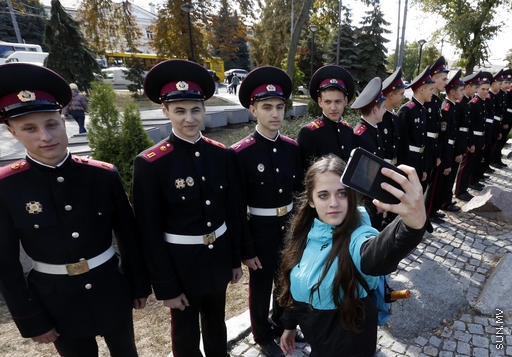
KIEV, Ukraine (AP) — Representatives of Ukraine and separatist rebels agreed Wednesday to pull back troops and weapons from several areas in eastern Ukraine in an attempt to shore up a fragile peace agreement.
Darka Olifer, spokeswoman for ex-President Leonid Kuchma who represents Ukraine in the so-called Contact Group, said that the agreement signed in the Belarusian capital, Minsk, applies to three specific areas and will be monitored by observers from the Organization for Security and Cooperation in Europe.
She said that the deal was signed by Kuchma, Russian representative Boris Gryzlov and OSCE envoy Martin Sajdik. Rebel representatives in the group said that the separatist leaders of the Donetsk and Luhansk regions would honor the agreement, Olifer added.
The conflict in eastern Ukraine between Russian-backed separatist rebels and Ukrainian government troops has killed more than 9,600 people since it erupted in April 2014, according to the United Nations. A February 2015 agreement in Minsk, which was brokered by France and Germany, helped end large-scale battles, but smaller clashes have continued to claim lives and a political settlement has stalled.
Wednesday's agreement follows a visit to Ukraine last week by the French and German foreign ministers, who sought to revive the fragile peace agreement.
A cease-fire declared last week has helped reduce fighting, and the pullback of troops and weapons from three locations should further stabilize the situation and serve as a model for a broader withdrawal of forces. Unlike earlier deals to withdraw artillery and armor, the new agreement also refers to troops and small arms.
"This document is intended to de-escalate the situation along the line of contact and effectively creates conditions to prevent the use of firearms," Olifer said. "Its implementation in those three areas would allow the working-out of approaches for possible separation of forces along the entire line of contact."
Last year's Minsk deal envisaged that Ukraine only regain control of the rebellious region's border with Russia after granting it special status, holding local elections there and offering amnesty to the rebels. That provision has drawn strong criticism in Ukraine, and Ukrainian President Petro Poroshenko has been cautious in pushing it through parliament, fearing public anger.
Ukraine has accused Russia of failing to withdraw its troops and weapons from the east, but Moscow has denied it has any presence there. The Kremlin, in turn, has argued that Ukraine has failed to meet its end of the Minsk deal by not providing autonomy for the eastern regions and calling elections.
Speaking during a visit to Ukraine last week, German Foreign Minister Frank-Walter Steinmeier voiced hope that the latest cease-fire would become a lasting truce and urged Ukraine to move forward on local elections, a special status for the rebel regions and an amnesty for the rebels.